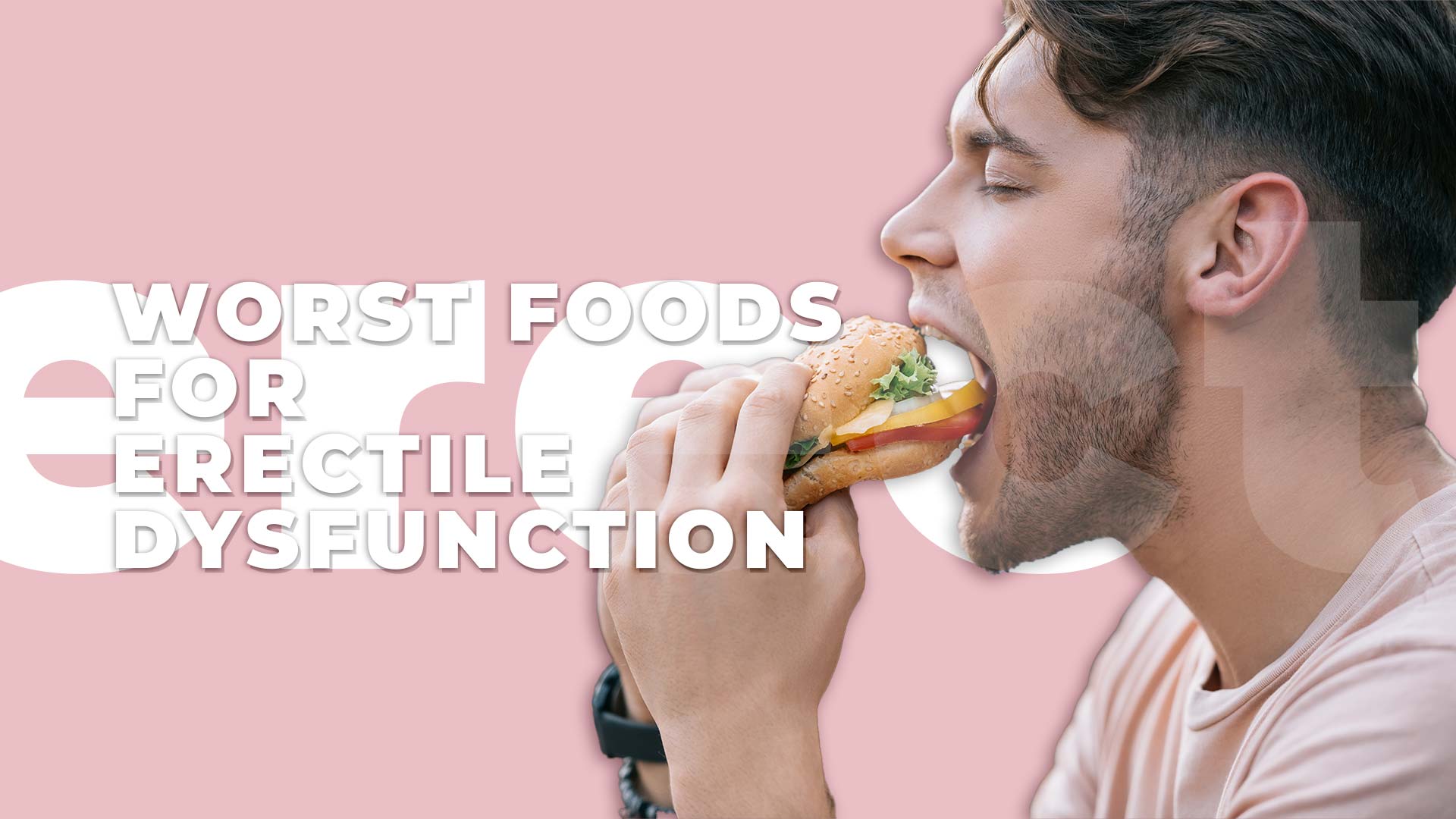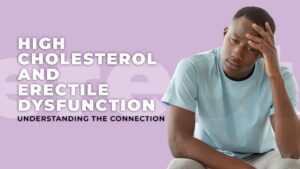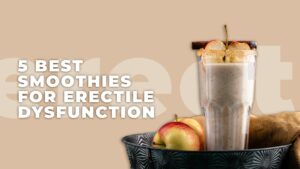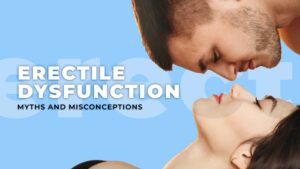Erectile dysfunction (ED) is a common issue where one may have difficulty getting or maintaining an erection. Although often associated with aging, it can affect men of any age.
Presently, the most effective way to treat ED is through medication like sildenafil (found in Cenforce) and other similar drugs. In addition to medication, changes to your habits, lifestyle, and diet can also aid in improving sexual performance. Among these lifestyle factors, diet plays a significant and often underestimated role in either promoting or mitigating ED.
This article delves into some of the worst foods for ED, shedding light on why they should be consumed sparingly or avoided altogether.
Can Diet Help with Erectile Dysfunction?

ED can range from occasional difficulties achieving an erection to persistent inability to attain an erection. If you have mild to moderate ED, dietary changes and lifestyle modifications can enhance your ability to get an erection.
Choosing healthy foods and taking care of your health can improve your sexual performance in the long run. However, if you have severe or persistent ED, dietary changes alone may not be enough. Science-based ED medication such as sildenafil, tadalafil, or avanafil may be necessary. It’s important to see dietary changes as a supplement to ED treatment, not a sole solution for severe cases.
What’s the Link Between Erectile Dysfunction (ED) And Diet?
ED is very common. It can be caused by various factors such as obesity, a sedentary lifestyle, diabetes, smoking, cardiovascular disease, high blood pressure, and high cholesterol. Making dietary changes, such as incorporating a Mediterranean or plant-based diet, can help reduce the risk of ED.
Consuming fatty foods, smoking, and excessive drinking can harden and block blood vessels and arteries. They are crucial in providing adequate blood flow to the penile tissues and can cause ED. Alcohol consumption can also lead to dehydration, reducing circulation and blood volume. This can negatively impact penile erections. Here’s an overview of the impact of diet on erectile dysfunction:
- Cardiovascular Health
The health of your cardiovascular system is closely linked to erectile function. Consuming too much saturated and trans fats, cholesterol, and processed foods can cause heart problems like atherosclerosis. This narrowing can affect blood flow to the penis, making it difficult to achieve or maintain an erection. On the other hand, eating lots of fruits, veggies, whole grains, lean proteins, and healthy fats can help your heart and might lower the chance of ED. - Obesity
Excessive weight and obesity are associated with a higher risk of developing ED. Obesity can lead to various health issues. This includes diabetes, high blood pressure, and hormonal imbalances. All these issues can contribute to erectile problems. Eating well and staying at a healthy weight can help with erectile function. - Diabetes
Uncontrolled diabetes can damage blood vessels and nerves, leading to ED. To control diabetes, monitor how many carbs you eat, manage your blood sugar, and eat a balanced diet. This can potentially minimize the risk of associated erectile problems. - Nutritional Deficiencies
Certain nutrients are essential for overall sexual health and function. For example, inadequate intake of zinc, vitamin D, vitamin C, and omega-3 fatty acids may contribute to ED. Consume a nutrient-dense diet that includes foods like seafood, fruits, vegetables, nuts, and seeds. These foods can help ensure an adequate intake of nutrients. - Alcohol and Substance Abuse
Excessive alcohol consumption and drug abuse can contribute to ED. Moderate alcohol intake may not have a significant impact. However, heavy drinking and substance abuse can cause hormonal imbalances, nerve damage, and psychological problems. These issues can lead to difficulties with erections. Reducing alcohol consumption and avoiding drug abuse can be beneficial for overall sexual health. - Psychological Factors
While not directly related to diet, psychological factors such as stress, anxiety, and depression can contribute to ED. It’s worth noting that a healthy diet can support mental well-being and indirectly impact erectile function.
Foods to Avoid for ED
Erectile dysfunction can result from a pattern of unhealthy eating. It can contribute to various circulatory and metabolic disorders. No single food determines your overall health, as the impact of your entire eating pattern is much greater. However, eating certain amounts of food or having long-term eating habits can harm male reproductive health. Here are some worst foods for erectile dysfunction
Fatty Foods
Saturated animal fats, trans fats, and high cholesterol levels can have negative impacts on heart health. It can also lead to a condition called atherosclerosis. It is a condition where fatty deposits accumulate in artery walls, leading to restricted circulation. This increases the risk of heart attacks and strokes. Reduced circulation can also affect sexual performance. It is recommended to avoid consuming fatty foods, especially when taking Viagra.
Excessive Sugar Intake
According to the Scientific Advisory Committee on Nutrition (SACN), overconsumption of sugary foods and beverages is linked to weight gain and an increase in Body Mass Index (BMI).
As obesity is a direct factor for erectile dysfunction, consuming too much sugar indirectly contributes to ED issues. Additionally, a diet high in sugar can lead to a cycle of blood sugar spikes and crashes. It can impact one’s ability to achieve and maintain an erection.
The frequent spikes in blood sugar levels caused by sugar consumption can also disrupt leptin levels. Leptin is a hormone that signals the brain to stop eating when full. They play a role in regulating one’s sex drive. When sugar is consumed, insulin production is triggered, and this cycle can affect sexual health if it occurs too frequently.
Alcohol
Drinking too much alcohol can harm your sexual health and performance. According to a study, 72% of men dependent on alcohol suffered from at least one sexual dysfunction. These included premature ejaculation, low libido, or ED.
Additionally, excessive alcohol consumption reduces blood flow to the penis. This hinders sensation and the ability to get and maintain an erection.
High-Protein, Low-Carbohydrate Diet
A diet high in protein and low in carbohydrates has been linked to lower testosterone levels in men. A review of 27 studies found that men who consumed low-carb diets with protein making up over 35% of their calorie intake had lower levels of testosterone both at rest and after exercising compared to those who consumed low-carb diets with moderate protein intake (less than 35% of calories from protein).
Baked Goods
Baked goods like cookies and crackers can contain high amounts of trans fat from margarine. Trans fat can block arteries and raise LDL cholesterol levels, potentially leading to sexual health issues.
Soy Foods
Although soy foods can be good for you, eating too much might lead to problems with erections and lower testosterone levels. Soy contains phytoestrogens. These are compounds that have a similar structure to the female hormone estrogen. They may act as weak estrogens in the body. Some studies have suggested that high soy intake may have a negative impact on testosterone levels and sexual function. However, these findings are not conclusive.
White Bread and Processed Carbs
Consuming excessive amounts of white bread and processed carbs can contribute to weight gain. It can also lead to decreased testosterone levels and increased estrogen levels. This is particularly true for those who follow a Western-style diet.
Canned Meats and Soups
Canned meats and soups are high in sodium and can negatively impact erectile function. both from its effects on blood pressure and its direct impact on erectile function. Although there are lower-salt choices, many people still choose high-salt options that can harm sexual health.
Refined Carbs
Research suggests that excessive consumption of refined carbs, high fructose corn syrup, and a high-caloric diet are key contributors to metabolic conditions. This may result in erectile dysfunction.
Overindulging in sweetened drinks, such as soda, may result in a gradual and unnoticed decline in sexual function. It can eventually progress into full-blown ED.
Best Foods for Erectile Dysfunction

Consuming certain foods can positively affect the health of the penis and other male reproductive organs. Here are foods that promote penile blood flow:
Nitrate-Rich Vegetables
Vegetables like spinach and lettuce contain nitrates which have a blood vessel-widening effect and improve blood flow, according to the African Journal of Traditional, Complementary, and Traditional Medicines.
Nitrates are converted into nitric oxide in the body, which is important for maintaining vascular health and blood flow. Research shows that green leafy vegetables contain the highest concentration of nitrates, while root and fruit vegetables contain lower amounts.
Shellfish
Shellfish, such as oysters, are rich in zinc, a mineral that has been linked to higher testosterone levels. Testosterone is the primary male sex hormone. It plays a crucial role in sexual function, and low levels of it can lead to issues like erectile dysfunction.
Research has shown that zinc supplementation may increase testosterone levels in men. Oysters contain the highest levels of zinc of any common food, with a single serving providing 673% of the daily recommended intake. Zinc is also found in crab, lobster, beef, pork, beans, chicken, fortified cereals, chickpeas, and pumpkin seeds. Zinc is also commonly available as a supplement.
Lycopene-Rich Fruits
According to Frontiers in Pharmacology, fruits such as tomatoes, watermelon, guavas, papaya, and others are high in lycopene. It is a vital plant nutrient with antioxidant properties. Lycopene has many health benefits. It improves blood vessel function and lowers cardiovascular risks.
There is limited research is available on the impact of lycopene on sexual performance in humans. However, some animal studies have shown that it may improve erectile health. For instance, a 2012 National Center for Biotechnology Information study found that lycopene restored erectile function in male rats with ED.
Another study in PLOS suggested that lycopene may benefit cardiovascular health, which is crucial for erectile function. However, animal study results may not be applicable to humans.
Many fruits and vegetables are also rich in other compounds and nutrients that may treat ED. For example, watermelon has the amino acid L-citrulline, which is linked to various vascular health benefits, as shown in a 2017 Current Opinion in Clinical Nutrition and Metabolic Care review.
In a limited study of 13 people, a combination of L-citrulline and resveratrol improved erectile function in men who used PDE5 inhibitors to treat ED.
Mediterranean Diet
Research has shown that Mediterranean diet foods can help with heart health, blood flow, and erectile function. The American Heart Association found that the Mediterranean diet can lower the risk factors for certain diseases that are linked to erectile dysfunction.
The Mediterranean diet is composed of
- a variety of fruits and vegetables,
- nuts, seeds,
- grains,
- moderate amounts of dairy,
- eggs, poultry,
- fish, and
- mainly uses olive oil as its source of fat.
This diet limits sugar, salt, processed carbs, and fatty meats. It encourages healthy fats and plant-based foods.
The Mediterranean diet lowers the risk of heart disease. It also helps with antioxidants, lipids, glucose metabolism, and arginine levels. These benefits may improve nitric oxide levels and protect against erectile dysfunction.
A review of four clinical trials published in the Central European Journal of Urology in 2017 found that following the Mediterranean diet may reduce the risk of ED.
Coffee
Research on the relationship between coffee and erectile health is mixed. In 2015, a study in PLOS One showed that men who had less caffeine were more likely to have ED. Men who drank one to two cups of coffee daily had lower chances.
However, a different study published in the American Journal of Epidemiology in 2018 found no significant difference in ED risk between men who consumed the highest amount of coffee (4+ cups per day) and those who consumed none. The impact of coffee on ED is still unclear. Some studies show a possible effect, while others don’t find a significant link.
Flavonoid-Rich Foods
Dark chocolate may have benefits for individuals experiencing ED. Research has found that a higher intake of foods high in flavonoids is associated with a reduced risk of ED. Flavonoids are naturally occurring plant chemicals with antioxidant effects.
One food type with a high flavonoid content is cocoa, which is found in dark chocolate, making it a rich and delicious source of flavonoids. Other foods rich in flavonoids include nuts, whole grains, fruits, vegetables, red wine, and tea. Eating too much chocolate isn’t good for your health, but having a little dark chocolate every day can improve blood flow and erections.
Foods that contain flavonoids are:
- Tea
- Wine
- Leafy vegetables
- Herbs
- Onions
- Apples
- Berries
- Cherries
- Soybeans
- Citrus fruits
- Dark chocolate
L-Arginine Containing Proteins
L-arginine is an amino acid present in protein-rich foods. It can be found in red meat, poultry, seafood, dairy, and nuts, and plays a crucial role in creating nitric oxide. Nitric oxide helps relax smooth muscles and maintain an erection during sexual arousal.
Nutrients Journal states that L-arginine can be easily obtained from various protein sources. Additionally, it is also available in supplement form for athletic performance.
Studies, including one published in Andrology, have shown that men with ED often have low levels of L-arginine. In 2003, a study in the Journal of Sex & Marital Therapy found that a combination of L-arginine and pycnogenol (derived from the Pinus pinaster tree) improved sexual performance in men with ED over a period of several months.
Ways to Improve Sexual Performance

Here are some lifestyle changes to consider for better sexual performance and reduced risk of ED:
- Achieve a healthy weight
Obesity and ED have a strong connection, with a study showing that having a body mass index (BMI) in the obesity range increases the risk of ED three-fold. To minimize the risk of ED, strive to maintain a healthy weight. While BMI is not perfect, aiming for a BMI within the normal range, as recommended by the CDC, can reduce the risk of erectile health issues. - Exercise frequently
Aerobic exercise has been linked to improvements in sexual performance, as shown by a review of five studies. This review found men with ED who regularly exercised experienced improvements in their erectile health. Regular exercise in combination with a healthy diet can aid in weight loss, which is crucial in maintaining a healthy weight. - Quit smoking
A study in Andrologia found that smoking is a big risk for ED. The more tobacco smoked, the higher the risk for ED and heart disease. If you smoke, consider quitting to reduce the risk of ED.
Other lifestyle changes, such as reducing stress and treating underlying medical conditions like high blood pressure or heart disease, can also have a positive impact on sexual health and performance.
Final Thoughts
Certain dietary factors have an impact on the well-being of male reproductive organs. To enhance sexual health, include more foods that are rich in flavonoids, follow a Mediterranean-style diet, or consume more plant-based foods. Moreover, avoid foods that cause erectile dysfunction. Reducing alcohol intake and limiting processed foods can help maintain male reproductive health.
There are also FDA-approved medications to treat ED and premature ejaculation. These medications are effective in improving sexual function and performance.
FAQs
- Which foods cause erectile dysfunction?
The worst foods for erectile dysfunction include those high in saturated and trans fats, excessive sugar, processed foods, high sodium foods, and excessive alcohol.
- How do certain foods contribute to the development of erectile dysfunction?
Foods high in unhealthy fats, excessive sugar, and processed ingredients can contribute to the development of cardiovascular problems, obesity, hormonal imbalances, and damage to blood vessels and nerves, all of which can lead to erectile dysfunction.
- Does a high-fat diet have a negative impact on erectile function?
A high-fat diet, particularly one high in saturated and trans fats, can contribute to cardiovascular problems, obesity, and atherosclerosis, all of which can negatively impact blood flow to the penis and result in erectile difficulties.
- Are there specific types of fats that should be avoided for better sexual health?
Saturated fats found in red meat, full-fat dairy products, and fried foods, as well as trans fats found in processed snacks and baked goods, should be limited for better sexual health.
References
- University, W. S. (n.d.). Sexual dysfunction. Urology. https://urology.med.wayne.edu/impotence-sexual#:~:text=Decreased%20Bloodflow%20%2D%20A%20decrease%20in,blood%20pressure%20or%20pelvic%20trauma.
- Sugars and obesity. https://www.actiononsugar.org/sugar-and-health/sugar-and-obesity/
- Arackal, Bijil Simon; Benegal, Vivek. Prevalence of sexual dysfunction in male subjects with alcohol dependence. Indian Journal of Psychiatry 49(2):p 109-112, Apr–Jun 2007. | DOI: 10.4103/0019-5545.33257https://journals.lww.com/indianjpsychiatry/Fulltext/2007/49020/Prevalence_of_sexual_dysfunction_in_male_subjects.8.aspx
- Adamowicz J, Drewa T. Is there a link between soft drinks and erectile dysfunction? Cent European J Urol. 2011;64(3):140-3. doi: 10.5173/ceju.2011.03.art8. Epub 2011 Sep 6. PMID: 24578881; PMCID: PMC3921721.http://ceju.online/journal/2011/obesity-metabolic-syndrome-erectile-dysfunction-96.php
- Bevardi, et al. (2017, March 1). Nitrate in leafy green vegetables and estimated intake. African journal of traditional, complementary, and alternative medicines : AJTCAM.https://journals.athmsi.org/index.php/ajtcam/article/view/4643/2876
- Eddie Weitzberg, Michael Hezel, Jon O. Lundberg, David S. Warner; Nitrate-Nitrite-Nitric Oxide Pathway: Implications for Anesthesiology and Intensive Care. Anesthesiology 2010; 113:1460–1475 doi: https://doi.org/10.1097/ALN.0b013e3181fcf3cc
- Salehzadeh H, Maleki A, Rezaee R, Shahmoradi B, Ponnet K. The nitrate content of fresh and cooked vegetables and their health-related risks. PLoS One. 2020 Jan 9;15(1):e0227551. doi: 10.1371/journal.pone.0227551. PMID: 31917821; PMCID: PMC6952105.https://journals.plos.org/plosone/article?id=10.1371/journal.pone.0227551
- Ana Marcella Rivas, Zachary Mulkey, Joaquin Lado-Abeal & Shannon Yarbrough (2014) Diagnosing and Managing Low Serum Testosterone, Baylor University Medical Center Proceedings, 27:4, 321-324, DOI: 10.1080/08998280.2014.11929145 https://www.tandfonline.com/doi/abs/10.1080/08998280.2014.11929145
- Prasad AS, Mantzoros CS, Beck FW, Hess JW, Brewer GJ. Zinc status and serum testosterone levels of healthy adults. Nutrition. 1996 May;12(5):344-8. doi: 10.1016/s0899-9007(96)80058-x. PMID: 8875519.https://www.sciencedirect.com/science/article/abs/pii/S089990079680058X?via%3Dihub
- U.S. Department of Health and Human Services. (2021, March 26). Office of dietary supplements – zinc. NIH Office of Dietary Supplements. https://ods.od.nih.gov/factsheets/Zinc-HealthProfessional/.
- Mozos I, Stoian D, Caraba A, Malainer C, Horbańczuk JO, Atanasov AG. Lycopene and Vascular Health. Front Pharmacol. 2018 May 23;9:521. doi: 10.3389/fphar.2018.00521. PMID: 29875663; PMCID: PMC5974099.https://www.frontiersin.org/articles/10.3389/fphar.2018.00521/full
- Gao JX, Li Y, Zhang HY, He XL, Bai AS. Lycopene ameliorates erectile dysfunction in streptozotocin-induced diabetic rats. Pharmazie. 2012 Mar;67(3):256-9. PMID: 22530309.https://pubmed.ncbi.nlm.nih.gov/22530309/
- Figueroa, Arturo; Wong, Alexei; Jaime, Salvador J.; Gonzales, Joaquin U.. Influence of L-citrulline and watermelon supplementation on vascular function and exercise performance. Current Opinion in Clinical Nutrition and Metabolic Care 20(1):p 92-98, January 2017. | DOI: 10.1097/MCO.0000000000000340. https://journals.lww.com/co-clinicalnutrition/Abstract/2017/01000/Influence_of_L_citrulline_and_watermelon.14.aspx
- Masato Shirai, MD, PhD, Ippei Hiramatsu, MD, Yusuke Aoki, MD, Hirofumi Shimoyama, MD, PhD, Taiki Mizuno, MD, PhD, Taiji Nozaki, MD, PhD, Shinichiro Fukuhara, MD, PhD, Atsushi Iwasa, MD, PhD, Shinji Kageyama, MD, PhD, Akira Tsujimura, MD, PhD, Oral L-citrulline and Transresveratrol Supplementation Improves Erectile Function in Men With Phosphodiesterase 5 Inhibitors: A Randomized, Double-Blind, Placebo-Controlled Crossover Pilot Study, Sexual Medicine, Volume 6, Issue 4, December 2018, Pages 291–296, https://doi.org/10.1016/j.esxm.2018.07.001
- Di Francesco S, Tenaglia RL. Mediterranean diet and erectile dysfunction: a current perspective. Cent European J Urol. 2017 Jun 30;70(2):185-187. doi: 10.5173/ceju.2017.1356. Epub 2017 Jun 11. PMID: 28721287; PMCID: PMC5510347. http://ceju.online/journal/2017/mediterranean-diet-sexual-function-erectile-dysfunction-nitric-oxide-1356.php
- Lopez DS, Wang R, Tsilidis KK, Zhu H, Daniel CR, Sinha A, Canfield S. Role of Caffeine Intake on Erectile Dysfunction in US Men: Results from NHANES 2001-2004. PLoS One. 2015 Apr 28;10(4):e0123547. doi: 10.1371/journal.pone.0123547. PMID: 25919661; PMCID: PMC4412629.https://journals.plos.org/plosone/article?id=10.1371/journal.pone.0123547
- David S Lopez, Lydia Liu, Eric B Rimm, Konstantinos K Tsilidis, Marcia de Oliveira Otto, Run Wang, Steven Canfield, Edward Giovannucci, Coffee Intake and Incidence of Erectile Dysfunction, American Journal of Epidemiology, Volume 187, Issue 5, May 2018, Pages 951–959, https://doi.org/10.1093/aje/kwx304
- Whittaker J, Harris M. Low-carbohydrate diets and men’s cortisol and testosterone: Systematic review and meta-analysis. Nutr Health. 2022 Dec;28(4):543-554. doi: 10.1177/02601060221083079. Epub 2022 Mar 7. Erratum in: Nutr Health. 2022 Dec;28(4):783. PMID: 35254136; PMCID: PMC9716400.https://journals.sagepub.com/doi/10.1177/02601060221083079
- Cassidy A, Franz M, Rimm EB. Dietary flavonoid intake and incidence of erectile dysfunction. Am J Clin Nutr. 2016 Feb;103(2):534-41. doi: 10.3945/ajcn.115.122010. Epub 2016 Jan 13. PMID: 26762373; PMCID: PMC4733263.https://academic.oup.com/ajcn/article/103/2/534/4564750
- Katz DL, Doughty K, Ali A. Cocoa and chocolate in human health and disease. Antioxid Redox Signal. 2011 Nov 15;15(10):2779-811. doi: 10.1089/ars.2010.3697. Epub 2011 Jun 13. PMID: 21470061; PMCID: PMC4696435.https://www.liebertpub.com/doi/10.1089/ars.2010.3697
- Waheed Janabi AH, Kamboh AA, Saeed M, Xiaoyu L, BiBi J, Majeed F, Naveed M, Mughal MJ, Korejo NA, Kamboh R, Alagawany M, Lv H. Flavonoid-rich foods (FRF): A promising nutraceutical approach against lifespan-shortening diseases. Iran J Basic Med Sci. 2020 Feb;23(2):140-153. doi: 10.22038/IJBMS.2019.35125.8353. PMID: 32405356; PMCID: PMC7211351.https://www.ncbi.nlm.nih.gov/pmc/articles/PMC7211351/
- Rajapakse NW, Mattson DL. Role of L-arginine in nitric oxide production in health and hypertension. Clin Exp Pharmacol Physiol. 2009 Mar;36(3):249-55. doi: 10.1111/j.1440-1681.2008.05123.x. Epub 2008 Nov 28. PMID: 19076168.https://onlinelibrary.wiley.com/doi/full/10.1111/j.1440-1681.2008.05123.x
- Mirmiran P, Bahadoran Z, Ghasemi A, Azizi F. The Association of Dietary l-Arginine Intake and Serum Nitric Oxide Metabolites in Adults: A Population-Based Study. Nutrients. 2016 May 20;8(5):311. doi: 10.3390/nu8050311. PMID: 27213443; PMCID: PMC4882723.https://www.mdpi.com/2072-6643/8/5/311
- Barassi A, Corsi Romanelli MM, Pezzilli R, Damele CA, Vaccalluzzo L, Goi G, Papini N, Colpi GM, Massaccesi L, Melzi d’Eril GV. Levels of l-arginine and l-citrulline in patients with erectile dysfunction of different etiology. Andrology. 2017 Mar;5(2):256-261. doi: 10.1111/andr.12293. Epub 2017 Feb 8. PMID: 28178400.https://onlinelibrary.wiley.com/doi/full/10.1111/andr.12293
- Stanislavov R, Nikolova V. Treatment of erectile dysfunction with pycnogenol and L-arginine. J Sex Marital Ther. 2003 May-Jun;29(3):207-13. doi: 10.1080/00926230390155104. PMID: 12851125.https://www.tandfonline.com/doi/abs/10.1080/00926230390155104
- Skrypnik D, Bogdański P, Musialik K. Otyłość–istotny czynnik ryzyka zaburzeń potencji u mezczyzn [Obesity–significant risk factor for erectile dysfunction in men]. Pol Merkur Lekarski. 2014 Feb;36(212):137-41. Polish. PMID: 24720114.https://pubmed.ncbi.nlm.nih.gov/24720114/
- Centers for Disease Control and Prevention. (2020, September 17). Assessing your weight. Centers for Disease Control and Prevention.https://www.cdc.gov/healthyweight/assessing/index.html
- Lamina S, Agbanusi E, Nwacha RC. Effects of aerobic exercise in the management of erectile dysfunction: a meta analysis study on randomized controlled trials. Ethiop J Health Sci. 2011 Nov;21(3):195-201. PMID: 22435000; PMCID: PMC3275865.https://www.ncbi.nlm.nih.gov/pmc/articles/PMC3275865/
- Kovac JR, Labbate C, Ramasamy R, Tang D, Lipshultz LI. Effects of cigarette smoking on erectile dysfunction. Andrologia. 2015 Dec;47(10):1087-92. doi: 10.1111/and.12393. Epub 2014 Dec 29. PMID: 25557907; PMCID: PMC4485976.https://onlinelibrary.wiley.com/doi/10.1111/and.12393










Leave a reply